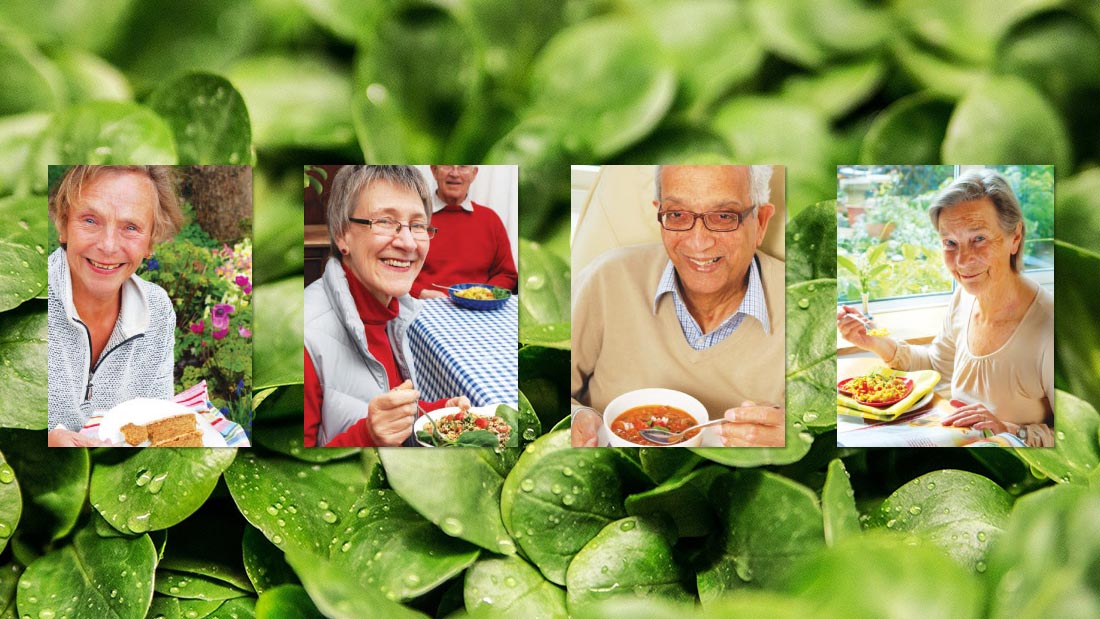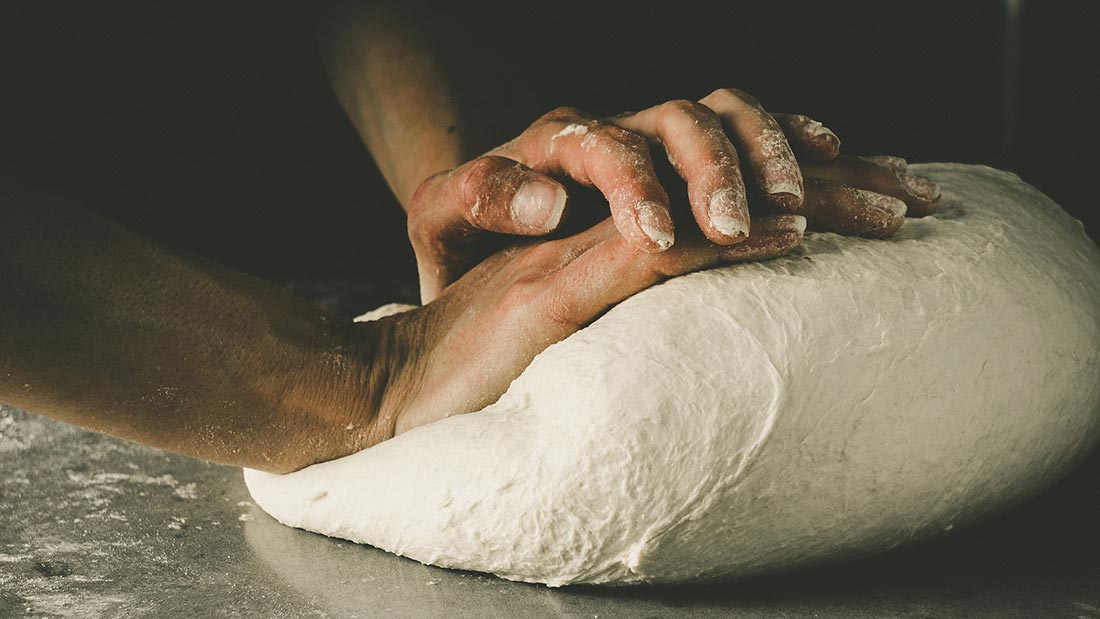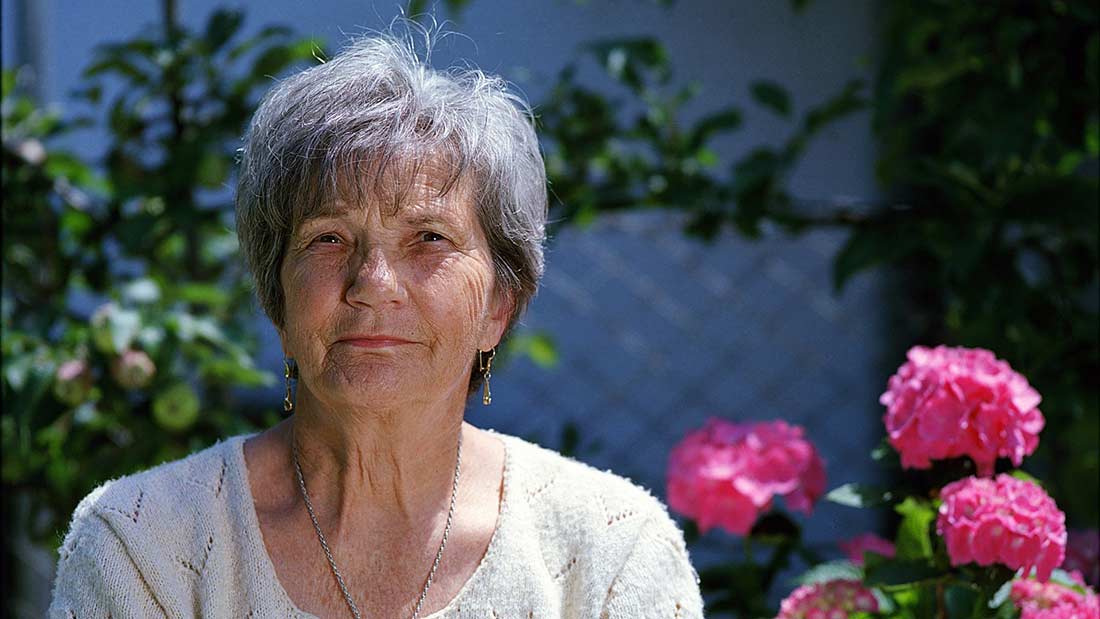Elders

This section is a guide to staying independent, getting connected, saving energy, and planning for the future. We hope that you’ll find it useful.
Viva! was founded in 1994. We appreciate that as we’ve got older, our supporters have, too!
We have put together some pages exclusively for Viva!’s elders. We hope that they’ll help you maintain your commitment towards ending animal suffering – throughout your golden years.


Refreshingly easy recipes for one or two
Practical advice on how to maintain a healthy, tasty and varied veggie diet.
Meals for one!
If you are a single person, maintaining a good and varied vegan and vegetarian diet might sometimes be difficult. We are all creatures of habit and it’s very easy to get stuck in a rut – especially if you have been feeling unwell and your appetite has been dulled. If you are struggling to eat solid food, Aymes make plant-based powdered supplement shakes. They’re certified vegan and can be useful if swallowing is a problem and you need a liquid nutrition boost. You may be able to request them on prescription.
A lack of interest in food can be a particular problem for people who have been recently bereaved. Not only are they faced with the emotional and physical effects of grief but they may also be having to adjust to just cooking for one person rather than two. This can be further complicated if the person who has died was the main cook in the household.
We have loads of useful recipes which can be adapted for one at our Vegan Recipe Club.

Stave off loneliness by getting involved
Information on how older men and women can overcome loneliness and enjoy life, building new friendships and hobbies.
As people grow older they can become increasingly vulnerable to loneliness. This not only stops them enjoying life but can also have a serious effect on their health.
This might be due to living alone, perhaps as a result of bereavement or one’s family moving away. However there can be many other causes. For example, having few friendships or hobbies, or feeling adrift following retirement.
The scale of the problem is highlighted by the statistic that in England 51% of over 75s live alone. 5 million older people say the television is their main form of company.
The problem can be exacerbated by people being reluctant to ask for help. Furthermore, while getting involved with a new activity can give you a fresh sense of purpose, it is still easy to feel tentative about taking that first step and meeting new people.
Get passionate about a new activity
One way to overcome your feelings of trepidation is to become involved with a cause you feel passionate about! What was it that inspired you to become a vegetarian or vegan? Are you willing to use the strength of your beliefs to help support those charities that promote these diets? For example, could you be a school speaker, a fundraiser or a regular letter writer to local newspapers?
Visit our Get Involved pages for more information.
It’s good to talk!
Chatting with a friend or relative over the phone can be the next best thing to being with them. Alternatively, if you would feel more comfortable talking confidentially about a particular issue to someone who doesn’t know you, then you can call the free Silver Line. This is a helpline that was established by Esther Rantzen in 2012 and its number is 0800 4 70 80 90.
There is also:
- Independent Age on 0800 319 6789
- Age UK on 0800 169 6565
- Friends of the Elderly on 0207 259 0154 – to receive a weekly or fortnightly friendship call from a volunteer who enjoys talking to older people.
Get connected
A good way to keep in touch with friends and family who may live far away is by using a personal computer or tablet (hand held computer). If you find this technology bewildering then help is at hand. Many libraries and community centres often hold regular training courses for older people to learn basic computer skills.
Computers and tablets enable you to share emails and photos with family and friends. You can also have free video chats using services such as Skype, Face Time or Viber, and make new online ‘friends’ or reconnect with old friends with social media sites such as Facebook or Twitter, and also website forums.
They can also be the ideal way to find local groups and clubs that share your interests and hobbies. For example, bridge, walking, knitting or even quiz nights! It might even encourage you to find out more about a wide range of new interests through groups such as the University of the 3rd Age.
On the move
Don’t wait for people to come and see you – travel to visit them! One advantage of being older is that public transport is better value. Bus travel is free for over-60s across the UK. And for longer distances, train and coach travel can be cheap too, especially if you book in advance online and use a senior rail card.
If you have mobility problems or live in a rural area with poor transport services, the Royal Voluntary Service can help connect you with volunteers who provide free transport. There are also often other community groups who can help with transport – why not use your new techie skills to find them!
Helping others
Many surveys have shown that helping others in your community can give you a great feeling of satisfaction and an energising sense of purpose. Why not use the knowledge and experience you’ve gained over a lifetime to give something back to your community?
There are so many volunteering opportunities that relish the qualities and skills of older people – such as patience, experience and calmness. Just some examples are helping in a local charity shop or hospital, the Citizens Advice Bureau and school reading programmes.
What are we going to do about men?
It is a well-known fact that men can be particularly bad at seeking help or beginning new activities if they find themselves becoming isolated and lonely. Often this is after retiring when they find that most of their friends were actually their work colleagues. They may also struggle to fill their expanded spare time with new activities.
Help may be at hand with the recent growth of Men’s Sheds!, an initiative run by the UK Men’s Sheds Association.
A Men’s Shed is a larger version of the typical man’s shed in the garden – a place where he feels at home and pursues practical interests with a sense of ‘being in charge’. A Men’s Shed offers this to a group of men. They can share the tools and resources they need to work on projects of their own choosing, at their own pace, and in a friendly venue. Basically, they are places of skill-sharing and informal learning and are somewhere that men can come together to work on projects that interest them.
A Shed’s activities will usually involve making or mending in wood (e.g. carpentry, joinery, turning, carving) but may include metalworking (milling, sheet metal, welding) bike repair, gardening, electronics, tool renovation and even boat renovation.

Care Homes that Care – Your Essential UK List
How to find a care home that provides good and varied meals for older veggies and vegans.
In recent years an urgent debate has been taking place about how well older people are treated in the care system.
One key aspect of this debate focusses on the question: if we accept that care homes generally offer good standards of care and a safe environment, then why is it that almost all of us would dread entering one or placing our parents in one?
Most studies suggest that the underlying problem is that as care homes increasingly operate according to standard procedures then all too frequently residents no longer feel involved in decisions that determine the quality of their life. As a result, residents can lose their sense of independence and dignity.
For older vegetarian and vegans, these issues often come to prominence when their diet is compromised. This might be due to a lack of knowledge about what vegetarians and vegans eat and/or reflect a very limited range of meals.
Whatever the reason, having their dietary choice compromised can cause great upset and distress. A person’s decision to be a vegetarian or vegan is likely to reflect deeply held ethical, health or religious convictions. For an older person, these convictions will have been at the core of their identity for many years. Seen in this light, it is clear that respecting and supporting an older person’s vegetarianism or veganism is incredibly important. It is an essential part of recognising who they are and treating them with dignity.
Both of these issues are imperatives that drive the work of the charity Vegetarian for Life. Founded in 2008, the objective of this young and growing charity is to improve the quality of life of the UK’s older vegetarians and vegans.
Consequently, it seeks to work closely with the care industry to ensure that chefs and cooks have a thorough understanding of what comprises good and varied vegetarian and vegan diets. The main mechanism for this work is the charity’s UK List – a geographical listing of ‘veggie and vegan friendly’ members. With over 800 List members this an excellent resource for anyone trying to find a suitable care home.
The List includes care homes, retirement complexes, food suppliers and other services that cater for older people and follow the charity’s Code of Good Practice. This Code of Good Practice outlines the ingredients that are acceptable for vegetarians and vegans, identifies common stumbling blocks and also encourages the provision of choice.
The charity provides UK List members with a wide range of information, of which the 32-page guide Catering for Older Vegetarians and Vegans is one of the most popular. UK List members also have the opportunity to send their chefs on the catering courses that the charity organises and subsidises – an excellent way to gain some practical experience!


Our favourite easy-to-follow money-saving tips
Top tips to save money on your energy bills and keep your home warm and comfortable during cold winters.
You might be concerned about energy consumption because of its environmental implications – in particular climate change. But paying attention to your energy usage could also save you a significant amount of money. Here are just a few of our favourite easy-to-follow money-saving tips:
- Keep an eye on your thermostat. It’s estimated that turning your thermostat down by 1⁰C could reduce your annual fuel bill by up to £60. However, this should never be done if it will compromise your health or exacerbate existing health conditions.
- Save time and stock up when you cook. If you’re going to use the oven, bake a few meals at a time to get the most out of having your oven on. This can be a great opportunity to stock up your freezer with some tasty meals for the weeks and months ahead. Plus a fuller freezer doesn’t have to work so hard, saving even more energy.
- Let your oven heat your home. After cooking, why not leave the oven door open and let it heat your kitchen?
- Degrees matter. It is thought up to 90% of the energy used by a washing machine is used in heating up the water. Make use of new washing detergents that can wash effectively at only 30–40⁰C – and lower the temperature setting on your future washes.
- Standby for action! With a growing number of remote controls we’ve become used to leaving many of our electrical devices on standby rather than switching them off. The Energy Saving Trust believes that up to £80 a year is wasted in the average home because of appliances left on standby. Well worth making that extra effort to switch them off!
Are you ready to switch?
The Government encourages people to shop around to find the most economic energy deal. But many of us are deterred by stories of poor customer service and billing errors. However, a glance at some of the savings available might just encourage you to take the plunge and make that switch. An easy way to gauge any savings you might be able to make is through comparison websites. A good place to start is www.goenergyshopping.co.uk. This is a website run by Ofgen, the energy industry regulator. It explains clearly how the process of switching works. It also lists a number of approved switch comparison websites.
Green energy
Electricity generation remains the biggest source of carbon emissions in the UK. Concerned about the environment? Then an important decision that you can make is getting your energy from a supplier that prioritises using renewable energy sources.
Ecotricity is one of the most well-known green energy companies. When assessed by lifecycle carbon emissions the electricity it supplies is the greenest of any company in Britain. The company also has a number of environmental initiatives that distinguish it from most other companies. For example, it is the only supplier of green gas in Britain.
There is one other big advantage that might appeal to you. Switch your energy supply to Ecotricity and not only will you be using green energy at a fair price but as a thank you they will donate up to £60 to Viva! Either quote reference VIVA if you call them on 08000 302 302. 0r follow this link: Viva! electricity.
Where there’s a will…
How to find trustworthy advice on how to make a will, how to ensure it is legal, and also how to update it.
Death and money are two subjects that most people aren’t comfortable talking about. So it’s no real surprise that an estimated 52% of the 50 million adults living in the UK have not made a will (Willaid 2014).
The same survey found that, despite the many ways in which our lives change, once people had made a will they rarely thought about going back to revise it!
And yet, wills are incredibly important legal documents – they let you decide who will look after your estate when you die and also who will benefit from your estate and who will not.
You may wish to leave a specific gift (such as a painting) or a pecuniary gift (such as cash).
You are also able to decide who should benefit from the rest of your estate. Making these decisions in your will can make the task of sorting things after your death much easier for your family and friends. This is especially true if family relationships have been difficult – and also if a number of people believe that you definitely promised them that special ornament!
Leave a Legacy
Legacies are a promise to the animals who need us most — a promise that no matter what, Viva! will be there to help them. Every gift makes a difference.
We are delighted to announce that we have partnered with The Goodwill Partnership, making leaving a gift as simple as can be. Our supporters have the opportunity to make or amend a simple Will in the comfort of their own home absolutely free of charge*. As we are a charity, your bequest will be entirely free of Inheritance Tax.
*Viva! will fund the cost of a simple Will for you and your partner/spouse. However, should you have more complex requirements, The Goodwill Partnership will be able to advise you on what action to take and whether additional legal advice and products may be appropriate and any additional costs which may be involved.
Why leave a legacy?
Many charities rely on legacies; they simply wouldn’t be able to continue their work without them. By leaving a gift to your chosen charity, you are actively ensuring their work can continue.
Why choose Viva!
Your support is vital in helping us to end factory farming. Your gift will help to protect our planet for future generations and will enable us to move one step closer to a vegan world.
Setting up a legacy today can help Viva! grow, enabling talented people to join our fight for life. It can help our campaigns to reach millions of people, empowering the nation to be kind to all kind. It can provide much needed support and guidance to those individuals already on their journey of compassion.
Our promise to you
We are immensely grateful to everyone who leaves a legacy in their Will, and so, in return, we promise to handle your legacy with the utmost respect and care. We promise to respect your wishes and to use your gift efficiently and effectively, so that your gift can do the greatest amount of good for the animals.

Make sure your wishes are honoured as fully as possible.
How to plan the type of funeral ceremony you would like.
Not surprisingly, most of us are quite happy to avoid thinking and talking about our own funeral.
And yet thinking ahead and making decisions about our funeral can make sure that our wishes are honoured as fully as possible. It also takes a stressful burden of decision-making at a time of grief off our bereaved family and friends.
That burden is not only an emotional one. Funeral costs are considerable – on average a funeral in the UK now costs £3,600!
In terms of the style and content of a funeral, many choices are available. Naturally, making the most of these choices requires making decisions and planning ahead. And remember; once you have made some decisions these can always be revised at a later date if you change your mind about some aspect of your funeral. So being slightly undecided about some detail of your funeral is not a good enough excuse to delay your planning!
Making decisions about your funeral in advance of your death is the key stepping-stone to having a funeral ceremony that reflects your personality, life and beliefs. If you have made those decisions it is of course essential that your family, next of kin or carers know your choices. They are the people who will be organising your funeral!
The key choices facing you are:
- Which Funeral Director? You may already have a preference or may decide to use a firm who have traditionally been involved with funerals in your family. You may even have a funeral finance plan already established. One way of selecting one is to talk to them in advance about the type of funeral ceremony you would like to be clear they will honour your decisions.
Lists of Funeral Directors are available from the National Association of Funeral Directors and also the Society of Allied and Independent Funeral Directors.
It is also possible for your family and friends to arrange many aspects of your funeral themselves. This not only reduces the overall cost but can make it a very personal farewell. The Natural Death Centre provides an excellent range of resources if this is something you would like to consider.
- How will be your funeral service be paid for? The current estimate for a funeral service is £3,600, which is a substantial sum and can provide problems for your family if it has not been anticipated or prepared for.
This is why increasing numbers of people now subscribe to a funeral plan. Most plans offer you a choice of a range of funerals that include different features and therefore have different prices. Effectively these plans freeze the cost of your funeral at a price you know today and prevent any burden falling on the bereaved. It is now possible for you to pay into a funeral plan either with a lump sum or through monthly instalments.
Most Funeral Directors offer funeral plans and will be glad to talk to you about the plan details. However, there is a wide range of funeral plans available to you and it is worth doing your research! In particular, it is wise to choose a plan that is provided by a company approved by the Funeral Planning Authority. This offers peace of mind as to how your money is looked after and also has a dispute resolution process.
- Cremation or burial? This decision will come down to personal beliefs. Currently, just over 70% of funerals in the UK are followed by cremation. If you elect for cremation, the next decision you face is what you would like to happen to your ashes. Here, your choices are almost endless – perhaps scattered at a favourite beach, interred in a cemetery or even fired into the night sky on a firework rocket!
- One of the noticeable trends in recent years has been the growing popularity of green funerals, which are also known as natural burials.
People will typically choose this style of burial because they are concerned about their impact on the environment. They wish to be as careful in death as they have been during their lives to be as environmentally friendly as possible.
A natural burial seeks to minimise its impact on the natural environment. So certain rules are usually followed – embalmed bodies are not typically accepted due to the later release of the chemicals used. Coffins must be fully degradable. Also memorials are usually not permitted, although the grave location is carefully plotted. Some burial grounds mark a grave by planting a tree, while others maintain the burial grounds as natural wildflower meadows, which look absolutely beautiful!
Many natural burial grounds are members of the Association of National Burial Grounds. Their website offers a search facility to find a burial ground near you and also has some wonderful photographs of their setting.
- What type of service? This is where you have most choice. No longer do you need to follow the structure and content of a traditional religious service. Increasingly, funeral ceremonies are a celebration of the life of the person who has died. This means that the ceremony in both structure and content reflects the unique life of the person who has died. Not only is this a very honest and warm way to remember someone but also it is a way to instil special memories in those who attend.
- Who will perform the service? Funeral Directors will have lists of clergy and other celebrants who they work with on a regular basis. Unless you offer specific instructions, you are leaving this vital choice to a Funeral Director who in all probability has never met or known you. Therefore your choice of celebrant is crucial. If you do not follow a particular religion, a list of non-religious funeral celebrants is available from the British Humanist Association.And remember, it is also possible for your family and friends to lead the ceremony themselves – not only a very personal farewell but also something that reduces the overall cost of your funeral.
